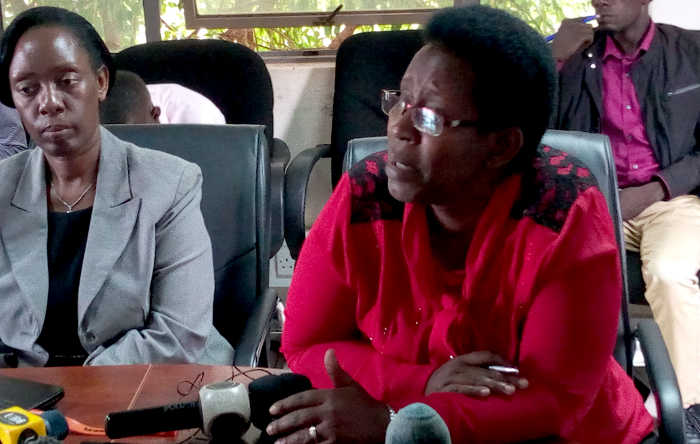The permanent secretary of the ministry of health Dr. Diana Atwine has said that poor sample collection and handling is one of the major hindrances of proper treatment of cancer in the country.
Dr. Atwine revealed this while officiating a four days training of doctors, pathologist and midwives on cancer treatment that was organized by the Uganda cancer institute (UCI) and the Uganda National Health Laboratory Services (UNHLS) at the Uganda cancer institute headquarters in Kampala this week.
“Sample collections at all levels must be a priority that we really need to teach our people on how to collect the sample properly because the accuracy in the diagnosis also depends on how you collect the samples.” She said. “At sample collection stage we must ensure that we do the right thing.”
She also expressed a big concern on how the samples are handled after collection which has ended into giving patients wrong results and diagnosis.
“You collect a sample and again leave it outside and it gets contaminated. That alone even if you have the best laboratory in the world it will not give you good results the way we treat our patients largely depends on these processes”. She noted. “We don’t want to just bring results in time but also to bring results accurately.”
Dr. Atwine noted that accurate diagnosis is critical to proper management of cancer patients. She asserted that studies done both in Uganda and outside show that any delay in making diagnosis also leads to a delay in treating the patient. “Timely and correct diagnosis is so critical to improve the care of our patients and the outcomes.”
According to Dr. Atwine, inadequate histopathology equipment at different health facilities is a big gap yet the government wants to see laboratories that deliver quality work.
Dr. Nagala Annet the national coordinator the hub system in Uganda said that Uganda has over 1500 under the public sector alone. Where the ministry chose 100 laboratories which are in these hospitals to be able to improve them and made them hub centres.”
According to Dr. Annet, a hub is a laboratory situated with a health laboratory network with enhanced capacity providing more laboratory services with better quality
Dr. Patrick Obok the coordinator of laboratory quality assurance program in Uganda said that currently the country has ten (10) laboratories that have been upgraded to international standards. “By the end of next year the number shall increase to 25 we want by 2040 when all the laboratories have been upgraded to the international standards in order to attain our vision 20140″ he said.
According to the Uganda cancer institute (UCI) the number of recorded cancer patients increased by over 4,000 in 2016.
The Kampala Cancer Register shows that 32,617 new cases were recorded in 2018. This indicates that at least 350 new cancer patients were detected per 100,000 people compared to 2008 when the figure stood 250 per 100,000 people.
The most common cancers included cancer of the cervix, breast cancer, and Kaposis sarcoma, cancer of the stomach, lymphoma and liver cancer in women. Prostate cancer, cancer of the esophagus, liver and lymphoma in males and leukemia, Burkitt’s lymphoma, kidney and sarcomas were the most common in children.








